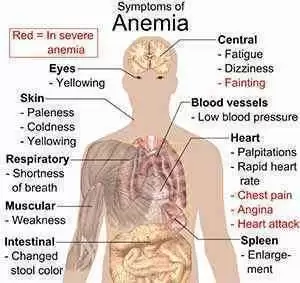
Celiac.com 10/17/2017 - Are primary care physicians under-testing for celiac disease in patients with iron deficiency anemia? A new survey of primary care doctors indicates that they are.
It's fairly common for people with celiac disease to develop iron deficiency anemia (IDA), but researchers don't know much about the frequency with which primary care physicians test for celiac disease in patients with IDA.
Celiac.com Sponsor (A12):
A team of researchers recently set out to describe how primary care doctors approach testing for celiac disease in asymptomatic patients with IDA.
The research team included Marisa Spencer, Adrienne Lenhart, Jason Baker, Joseph Dickens, Arlene Weissman, Andrew J. Read, Seema Saini, and Sameer D. Saini.
They are variously affiliated with the Department of Internal Medicine, University of Michigan, Ann Arbor, Michigan, United States of America; the Department of Internal Medicine, Henry Ford Health System, in Detroit, Michigan, United States of America; the Department of Statistics, University of Michigan, Ann Arbor, Michigan, United States of America; the Research Center at the American College of Physicians, in Philadelphia, Pennsylvania, United States of America; Department of Internal Medicine, University of Michigan, Ann Arbor, Michigan, United States of America, Ambulatory Care, Veterans Affairs Medical Center, Ann Arbor, Michigan, United States of America.
For their study, the team began by electronically distributing a survey to primary care doctors who are members of the American College of Physicians. The survey asked whether doctors would test for celiac disease, either by serologic testing, referral for esophagogastroduodenoscopy [EGD], or referral to GI) in hypothetical patients with new IDA, including: (1) a young Caucasian man, (2) a premenopausal Caucasian woman, (3) an elderly Caucasian man, and (4) a young African American man.
The team chose the scenarios to assess differences in testing for celiac disease based on age, gender, and race. They used multivariable logistic regression to identify independent predictors of testing.
Testing for celiac disease varied significantly according to patient characteristics, with young Caucasian men being the most frequently tested (61% of respondents reporting they would perform serologic testing in this subgroup (p
Interestingly 80% of doctors surveyed said they would definitely or probably start a patient with positive serologies for celiac disease on a gluten-free diet prior to confirmatory upper endoscopy, which is contrary to guideline recommendations.
This survey indicates that primary care doctors are under-testing for celiac disease in patients with IDA, regardless of age, gender, race, or post-menopausal status. The majority of primary care doctors surveyed do not strictly adhere to established guidelines regarding a confirmatory duodenal biopsy in a patient with positive serology for celiac disease.
Clearly, even with all of the advances in celiac disease awareness and with more refined protocols, primary care doctors have some work to do when it comes to testing IDA patients for celiac disease, and even more work to do in following proper referral guidelines before putting patients on a gluten-free diet.
Source:








Recommended Comments
Create an account or sign in to comment
You need to be a member in order to leave a comment
Create an account
Sign up for a new account in our community. It's easy!
Register a new accountSign in
Already have an account? Sign in here.
Sign In Now